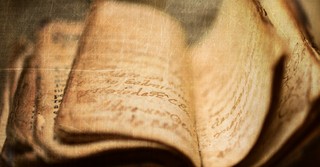Why Is the Book of Enoch Not Part of the Bible?
Share

The Book of Enoch is an ancient Hebrew apocalyptic religious text and contains stories of the origins of the demons and Nephilim. Some of the stories have influenced certain theological ideas (such as those about angels and demons, specifically the Watchers) and are consistent with the references made in Genesis 6:1-2 regarding the fall of the sons of God.
What is most commonly known as the Book of Enoch is only the first book. The entire text is actually a collection of three different books. 2 and 3 Enoch are much shorter and thought to have been written at a different time. Copies of the earliest sections of the first Book of Enoch were found among the Dead Sea Scrolls, indicating that while they are not a part of the Biblical Canon, they were used as historical books for teaching and learning. In fact, it is referenced by Jude, the half-brother of Jesus, in Jude 14-15.
Because only sections of 1 Enoch were found in the Dead Sea Scrolls, there is debate on when the Book of Enoch was written and who the author is. Some think it was written between 200-300 AD, which would be after the book of Malachi, and before the New Testament. Others believe the first Book of Enoch was written much earlier by the patriarch Enoch, who was the father of Methuselah and the great-grandfather of Noah. Because it is a compilation of several separate works, there could be several different authors over a time span of many years.
Why Was the Book of Enoch Not Included in the Biblical Canon?
The Book of Enoch is not recognized as the inspired Word of God or a part of the Biblical Canon. The word canon, in classical Greek, means straight rod or ruler and refers to any officially recognized collection of authoritative writings for a religion or group. To be included in the Canon of Scripture, a book has to fit into certain parameters set by early church leaders.
“These books were largely decided on by virtue of three factors: their divine qualities, reception by the churches, and connection to an apostle,” writes Michael J. Kruger at The Gospel Coalition.
There were a variety of reasons for a book to be rejected as a part of the Canon. Some of those include shifts in tone that don’t fit the style and narrative of the book and could have been added later. The extra stories of Esther are a clear example of this one. Another reason is the lack of manuscript evidence.
The Biblical Canon was ratified by the third Council of Carthage around 397 A.D, and the Book of Enoch was not included as a part of the Canon. While some parts of the Book of Enoch contain value, at some point, the book diverges from a biblical view, and the early church did not consider it consistent with other books of scripture. Therefore, it was not included in the Biblical Canon, or what we know to be the Holy Bible today.
Did Early Christians Read and Quote the Book of Enoch?
Early Christians did read and quote the Book of Enoch. As mentioned before, it is referenced in the Book of Jude, and it appears the early church was familiar with teachings from the book. In fact, Tertullian and Origen, both early Christian writers, wrote about it, so we can confidently say it was well known within the early church.
We can also assuredly say that while it’s clear the Book of Enoch was not a part of the Biblical Canon, it was used as a historical book for teaching and learning because copies of the earliest sections of 1 Enoch were found among the Dead Sea Scrolls. The early church would have been familiar with the teachings and understood them. In fact, some of its contents, especially that of Noah in book three, could have been legendary for early Christians.
While the early church would have known it as a historical and literary book, they would not have recognized it as sound theological teaching, and we shouldn’t either.
Which Churches Still Recognize the Book of Enoch Today?
Today, the Ethiopian Orthodox Church is the only Church that considers the Book of Enoch to be scripture, and makes that recognition because of its appearance in Jude, but no other major denomination considers it to be inspired Scripture.
The Book of Enoch is identified in the Pseudepigrapha, which is a large collection of Jewish writings not included in the Biblical Canon, and they are generally considered to have been written between the Old Testament and the New Testament.
Pseudepigrapha comes from the Greek word pseudo, which means false, and ephigraphein, which means to inscribe or write falsely. This doesn’t mean these are false teachings, only that they are not a part of the Biblical Canon.
These are not to be confused with the books of the Apocrypha (Greek for “secret”), which are generally recognized by the Roman Catholic Church, the Eastern Orthodox Church, and a few other groups as scripture, but not by the Protestant church.
What Does the Bible Say about Extra-Biblical Writings?
While extra-biblical writings can offer valuable insights and context, they are not divinely inspired and should be read with discernment, serving as a tool to understand Scripture, not a replacement.
2 Timothy 3:16 states, “All Scripture is God-breathed and useful for teaching, rebuking, correcting, and training in righteousness…”
John offers a warning in Revelation to those who add or subtract from the Inspired Word of God. Revelation 22:18-19 states, “If anyone adds anything to them, God will add to that person the plagues described in this scroll. And if anyone takes words away from this scroll of prophecy, God will take away from that person any share in the tree of life and in the Holy City, which are described in this scroll.”
Ultimately, the Holy Bible is the final authority for believers and should always be used as the final “ruler” by which we interpret other texts.
Conclusion: Is It Okay for Christians to Read the Book of Enoch?
Yes, it is okay for Christians to read the Book of Enoch, as long as it is read within the context of historical documents, and not as the inspired Word of God. Christians should read it with a discerning heart, understanding it is not authoritative or doctrinal.
The world has always had a large number of ideas, religions, and agendas, from early in the Old Testament to today. A Christian’s job is to read the Holy Bible as the ultimate standard and use other teachings, including the Book of Enoch, as a way to discern the differences between the inspired Word of God and other religious books.
The Book of Enoch is not included in the Biblical Canon for good reason, and Christians should reject it as the inspired Word of God. But Christians should not be afraid to read it because it’s not a part of the Canon. In fact, Christians read countless other books that are not a part of the Canon, and the Book of Enoch should be treated the same. It is another book to add to your tools to understand and speak intelligently with others.
Remember, the Book of Enoch was read by the early Church and known well enough to be referenced by Jude, and therefore, Christians can read it as we read all other books—with discernment.
Photo credit: ©Getty Images/BlackQuetzal

A firm believer that well-written stories have the power to change the world, Kate blends her love of storytelling with her passion for community. When she’s not writing, you can find her teaching workshops, sipping coffee, or dreaming up new ways to connect readers and writers through her brand Newsletters Made Simple.